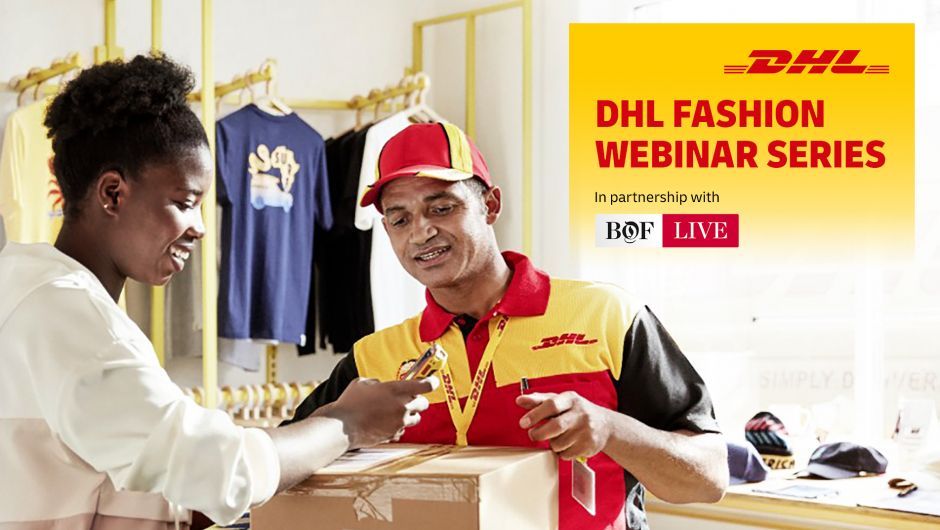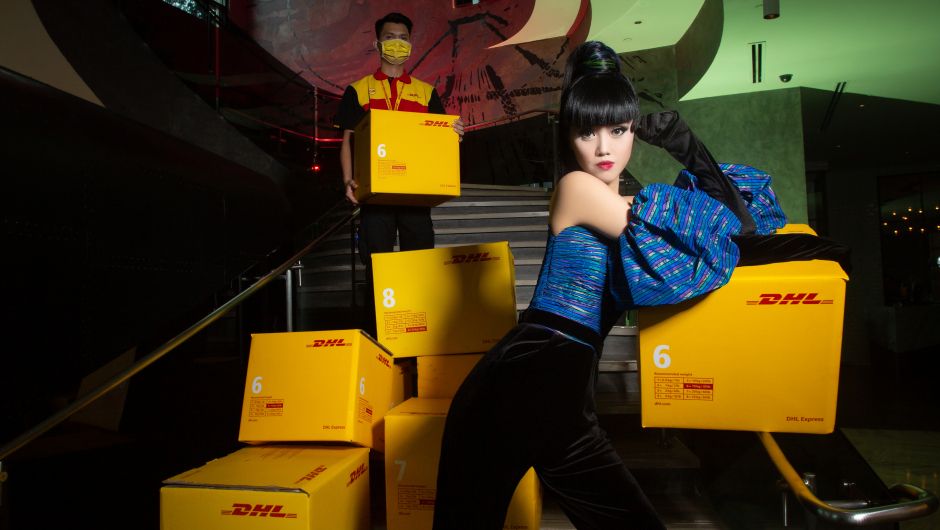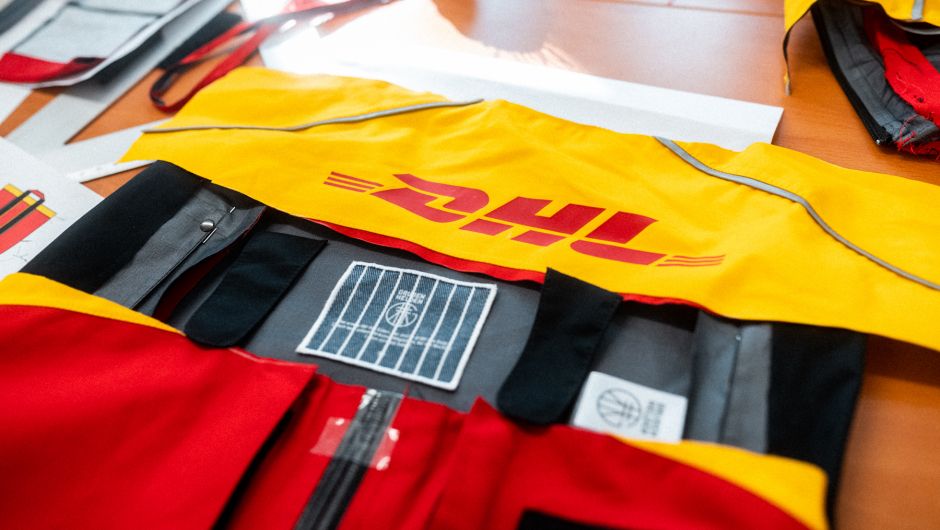Fashion
How Emerging And Established SMEs
Can Adopt Responsible Logistics Strategies
Hosted by Robin Mellery-Pratt, BoF's Director of Content Strategy, and joined by Emily Adams Bode, the Founder and designer behind luxury men's wear label Bode, and Mirella Muller-Wuellenweber, Sector President eRetail & Fashion, DHL Customer Solutions & Innovation, the 45-minute online discussion panel included several key takeaways, including the importance of data collection & planning, transportation methods, delivery route optimization and green packaging.
It is safe to say that e-commerce has undergone rapid growth in the past several months due to the global pandemic. Managing this shifting landscape can be difficult for SMEs, so working with a larger logistics company like DHL can be beneficial. DHL was one of the first logistics companies to respond to this shift and implement changes following the outbreak of COVID-19. The firm mobilized its Business Continuity Plans, which includes epidemic and pandemic risk scenarios, set up a dedicated task focus and implemented dedicated charter networks. A committed partner to the fashion industry for decades, DHL offers logistic solutions, supply chain management and warehousing. Over the past several years, sustainability has become one of its core principles. Setting a target to reach zero emissions by 2050, supported by scientific research, the company is keen to reduce its impact wherever possible. "The general transportation industry is responsible for 14% of all greenhouse gases," Muller-Wuellenweber pointed out, which is why DHL is investing in several green initiatives which range from innovative pick-up options, to multi-modes of transportation and new delivery solutions to help offset or inset their emissions. This way, the logistics firm can keep on meeting the needs of the industry while reducing their environmental impact.
Watch the highlights of the webinar here:
Analyze data to understand your business
It is also possible for SMEs to manage their own logistics and supply chains - as Bode has successfully done herself. Launching her namesake brand in 2016, the brand is as vertically integrated as possible, overseeing everything from delivery to product production. To ensure she does not run into any bottleneck situations, the brand gathers and measures data on everything from their production to their delivery. "Data collection is the first step to understanding the impact of your business," noted Bode. By collecting and analyzing data at several points, from the origin of resources through to shipping and delivering the finished product, her studio has been able to measure their input vs output and introduce procedures to help streamline their business. "Data collection can be implemented across the whole supply chain. It can be utilized to plan upstream, as well as optimizing the best delivery routes from warehouses to stores," said Muller-Wuellenweber. To help manage their delivery routes, DHL offers a special program which optimizes their routes to reduce emissions.
"Data planning is absolutely crucial
when it comes to curbing environmental impact."Mirella Muller-Wuellenweber, Sector President eRetail & Fashion, DHL Customer Solutions & Innovation
Having a delivery system which is agile, fast, and fully optimized to reduce the number of attempted deliveries and thereby emissions, is another responsible logistics strategy many SMEs are keen to adopt. But with so many choices on the market, choosing the right partner can be tricky. Both Bode and Muller-Wuellenweber agree that when finding the best solution, it is important to first look at customer expectations. "Speed isn't always the first and only focus. As a retailer, you need to understand what your customers' needs and expectations are," said Bode. For example, Bode offers luxury, handcraft pieces, which their customers understand takes time to create. "We always say it can take up to two weeks to even begin the shipping process, due to customization and personalization. Consumers do not care as much about timing when it is explained to them - especially when it is all done in-house, and the narrative is there."
Utilize new ways of delivery
New ways of delivery, such as working with local neighborhood drop-off points, are innovative solutions DHL is also exploring. "Speed is one thing, but we need to find convenient methods that are sustainable for everyone. We need to look at new models, like local pick-up points and make them more common to reduce the impact of deliveries on the environment," added Muller-Wuellenweber. For example, in the Netherlands, people can offer their houses or garages up as collective drop-off points with certain couriers. This way, individuals can make a profit, while reducing the number of delivery attempts made by couriers. At the same time it offers individuals a chance to connect with their neighbors and offer a convenient pick-up location for those who are not often home. But streamlining delivery routes is only half of the solution. To further reduce emissions, DHL is also investing in multi-modes of transportation.
Rather than heavily relying on air freight, the global logistics firm is cutting down on this transport mode as much as possible and investing in greener alternatives. Muller-Wuellenweber encouraged SMEs to plan their transportation carefully like they do with production and investigate alternative forms such as trains, ships, and trucks. In Germany, DHL is now using e-bicycles and electric vehicles for delivery, which has already made a positive impact. Muller-Wuellenweber adds, "We have been using combined forms of transport as well, such as trains and trucks with planes out of China. It comes down to planning and a willingness to try new models."
Using multi-modes of transportation is also easier when production is located closer to a retailer's key market - which is why nearshoring is also an essential responsible logistic solution to consider. For a brand like Bode, nearshoring is easy as the label does all its manufacturing in-house. However, rather than sourcing resources from overseas to produce collections, such as deadstock and vintage fabrics, Bode has been working with local agents in New York to access excess stock. This cuts down on potentially unnecessary shipping while connecting the brand with local businesses. Operating out of consolidated warehouses in key locations also helps retailers to reduce shipping time, emissions and streamline delivery routes.
Source sustainable packaging alternatives
Another vital component of shipping and delivery is packaging. Today, many companies like DHL offer sustainable packaging alternatives, but SMEs can also request for their logistics partners to consider more responsible choices as well, which was pointed out by Bode and Muller-Wuellenweber. SMEs are advised to think about the materials they are using for packaging now, whether they can reuse them or recycle them and their size. Filling materials are also important, as is cutting down on the use of plastic. Although it may seem daunting for SMEs to ask their partners to make sustainable changes when it comes to packaging, implementing more responsible practices themselves helps make it easier.
"Everything you ask of your partners, make sure is already part of your own business. It has to be a part of your mission statement."
Emily Adams Bode, Founder and designer behind luxury men's wear label Bode
Lastly, SMEs need to have a checklist, so they can learn more about how their partners work and hold them accountable for any set goals while making their own responsible logistics strategy. Bode, Muller-Wuellenweber and Mellery-Pratt all agree that SMEs should check the sustainability targets and goals of their partners and start discussions where needed. At the same time, they should also look for alternative methods and environment policies, working together with them to develop responsible solutions that are beneficial to all.
Read about sustainable practices in DHL’s White Paper
One of the best places for SME retailers looking to implement more responsible practices is to start their research by reading DHL’s insightful White Paper. Developed in collaboration with the British Fashion Council, and NGO Julie’s Bicycle, the White Paper addresses the environmental impacts of the global fashion industry, and provides recommendations on sustainable practices whilst examining future-facing solutions. The recommendations also include a checklist for SMEs to use as a guideline when setting up their own responsible logistics and supply management. Click here to download the White Paper.







Content from disqus has been blocked because you did not allow to load it.
Loading the blocked content will adjust your privacy setting and content from this service will not be blocked in the future.
You have the right to revoke or change your decision at any time.
Posting Guidelines
All communications on Logistics of Things should be appropriate for a professional community, respecting the diverse views of individuals from different backgrounds. We will review all comments and reserve the right to terminate or restrict access to user's account and to delete any content posted through it, without notice and at our discretion, if we deem it to be overly promotional, offensive, or off topic.
All posting become property of DHL.